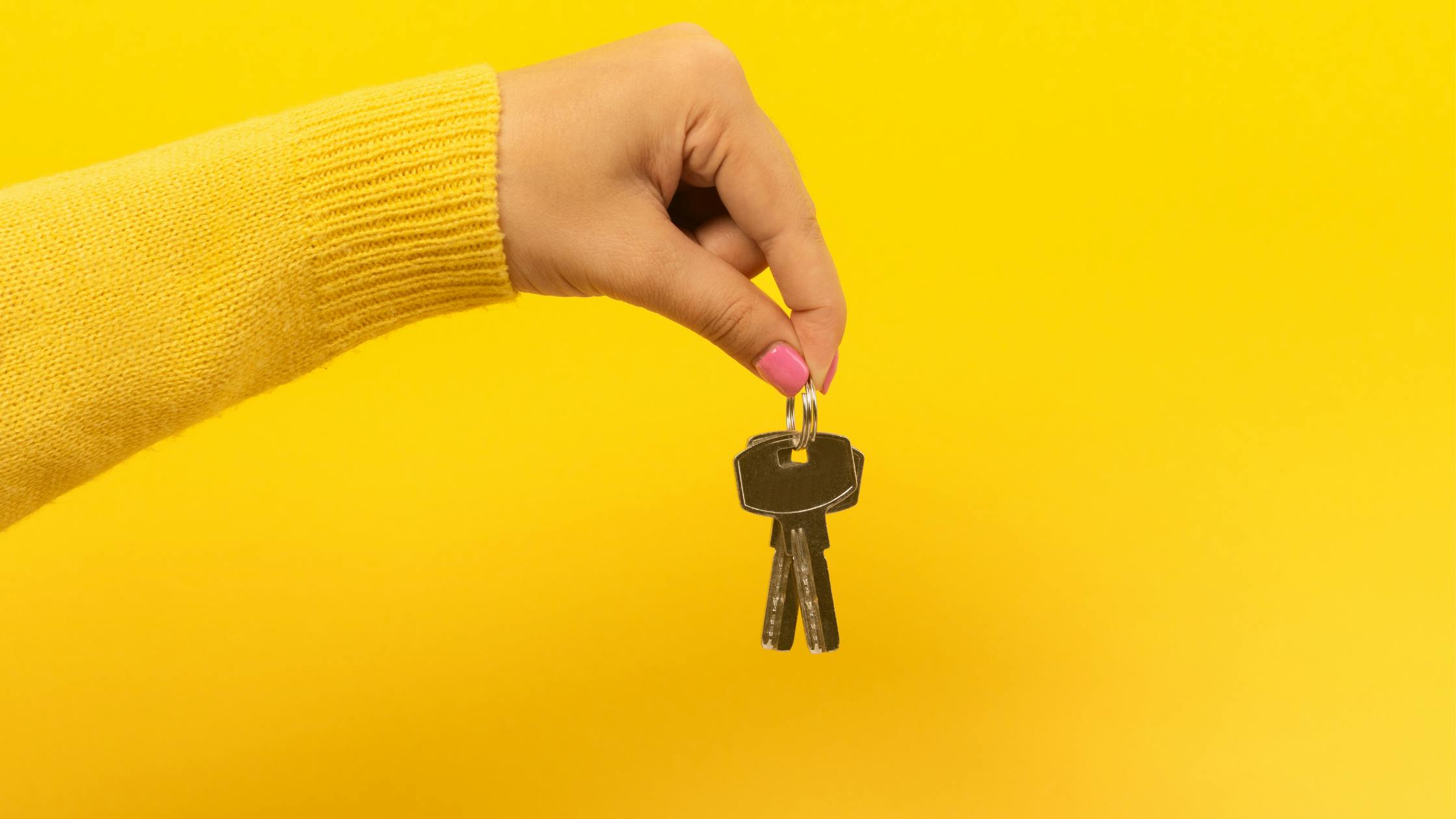What benefits do you get as a first-time buyer?
Even though it can feel hard to get on the property ladder, there are benefits to being a first-time buyer. To help you get your foot in your own front door, here’s our breakdown of some of the most creative first-time buyer schemes and deposit-boosing savings accounts that can help you buy your first home sooner.
Lifetime ISA
Saving for a house deposit is one of the biggest challenges for first-time buyers. With rising rents and the cost of living pushing budgets to the limit, building up a deposit can take several years or even more than a decade!
A Lifetime ISA (LISA) could help to speed up the process. This is a special ISA savings account that lets you save up to £4,000 each tax year towards your first home or retirement, and you’ll get a free 25% bonus off the government on top of whatever you save - meaning you’ll boost your deposit by up to £1,000 each tax year that you max out your account. Plus, if you’re planning to buy with another first-time buyer, you can have a LISA each, bringing your combined deposit (before interest) up to £50,000 in 5 years, assuming you’re both able to max out your accounts.
Max out your LISA for five years in a row, and you’ll turn a £20,000 deposit into a £25,000 deposit, and even more if you choose an account with a competitive interest rate. With the Tembo Cash Lifetime ISA, you’ll benefit from our market-leading interset rate of 4.1% AER (variable). That means you’ll earn hundreds more in interest over 5-years vs the next best rate on the market.
Save with the market-leading ✨ Cash Lifetime ISA ✨
Save up to £4,000 each tax year and get a free 25% bonus on top of your savings, up to £1,000. Plus, with the Tembo Cash Lifetime ISA, you'll earn 4.1% AER (variable) on your savings - that's hundreds more in interest towards your house fund vs saving with the closest competitor!
When considering opening a LISA, remember that withdrawals for any purpose other than buying a first home or for retirement will incur a 25% government penalty, meaning you may get back less than you paid in. Tax treatment depends on individual circumstances and may be subject to change in the future.
Stamp Duty relief
One benefit of being a first-time buyer is that you’ll pay less Stamp Duty than you would if you were buying your second, third or twentieth home. Stamp Duty is the tax you pay to the government when you purchase a property in England - there are similar taxes in Scotland and Wales. In April 2025, the tax-free threshold for first-time buyers fell to £300,000, meaning you’ll pay 5% Stamp Duty on anything between £300,001 and £500,000. Any portion of the property above £500,000, you’ll pay the same rates as second-time buyers.
Home movers moving up the ladder will also face a much bigger Stamp Duty bill from April - you’ll pay no Stamp Duty on the first £125,000 of your new property’s value, 2% on the portion between £125,001 and £250,000, and 5% on the portion between £250,001 to £925,000. If you’re buying a home worth more than £925,000, they’ll pay between 10 to 12% on any additional value. You can find out more about the recent changes to Stamp Duty here.
Looking for ways to cut costs? Take a look at our guide on how to reduce your Stamp Duty liability.
See what Stamp Duty you’ll pay
Use our Stamp Duty Calculator to see what you could pay on your first property purchase.
Guarantor mortgages
Another area that first-time buyers benefit from is the number of family-assisted options to help you buy sooner. You might be thinking this means your parents need to be millionaires, but this isn't the case. Today, there are loads of budget-boosting schemes and guarantor mortgages that allow parents to help their children make home happen.
Here are some of the top ways they could help you:
1. Income Boost
Your parents don’t have to use their property or savings to help you get on the ladder. They could use their income instead! An Income Boost involves adding a family member’s income (or a portion of it) to your mortgage application to boost what you can borrow for a mortgage. This could give you access to a bigger mortgage and help you buy a home sooner, as your borrowing potential will be based on your combined income, rather than your salary alone.
Your helpers will be named on your mortgage, meaning they’ll need to step in and help with the mortgage repayments if you’re ever unable to afford them yourself. But they won’t be named on the property, so they won’t get a say in what colour you paint the kitchen!
2. Deposit Boost
If your parents own their home and they want to help you buy your own place, a Deposit Boost lets them release money from their own property and put it towards your deposit. If you’re struggling to save money yourself, your parents’ contribution could make up your full deposit, but we often work with people who combine their own savings and their parents’ gift. Their gift is the top-up they need to access lower interest rates and make their monthly repayments more affordable.
You can also use a Deposit Boost and an Income Boost together to boost your deposit size and your borrowing capacity - like Liam did with his parents' help:
3. Savings as Security
With a Savings as Security mortgage, a family member can deposit 10% of the property’s value into a savings account with your lender. This money will act as a security for your mortgage for a set period, usually around 5 years. If you keep up with all your mortgage payments during this period, your helper will get their savings back (plus interest) at the end of the agreed term.
Perfect for you: How can a parent help with a mortgage?
Low deposit mortgages
If you’re struggling to save a deposit and you don’t have family help, it may be possible to get your keys in the door without a traditional 10% deposit through a low deposit scheme. Deposit Unlock, for example, lets you buy a new build property from a participating home builder with a 5% deposit. While the government’s Mortgage Guarantee scheme also lets you buy a home with just 5% upfront, but it doesn’t have to be a new build. You may be able to buy a house with a small deposit without one of these schemes, thanks to a growing number of lenders offering 95% Loan to Value mortgages.
Are you spending so much money on rent that you’re struggling to save a deposit? With Skipton’s Track Record mortgage, you may be able to buy a home with no deposit at all by proving that you’re a responsible tenant who pays rent and bills on time.
See which schemes you’re eligible for without applying
Create a free Tembo plan to check your eligibility against 20,000 mortgages and a range of budget-boosting schemes in seconds. At the end, you’ll get a personalised mortgage recommendation showing all the ways you could get on the ladder, including ways you could increase your budget.
First Homes
Fancy bagging a £300,000 property for just £210,000? You could with the help of the First Homes scheme, which gives first-time buyers a 30% discount on a new build home. The lower purchase price means you’ll need a much smaller deposit and mortgage than you usually would. Your monthly repayments will be more manageable too, leaving you with more cash in the bank for bills, furniture, and multiple tins of Farrow & Ball.
However, there are a few drawbacks to be aware of with the First Homes scheme. There aren’t many homes available through this scheme and you have to meet strict rules around income, location, and being a first-time buyer to qualify. Plus, when you sell later on, you have to offer the same discount you got - which can limit how much you make and make it harder to move up the property ladder. So while it helps some people get on the housing ladder, it’s not the right fit for everyone.
Find out your true buying budget
Wondering how you could boost your buying potential? We specialise in innovative and alternative ways to get on the ladder, including schemes designed to help first-time buyers. Create a free Tembo plan today to discover your options and see indicative monthly repayments and interest rates.




